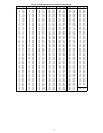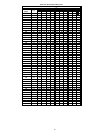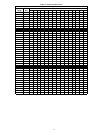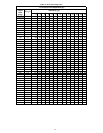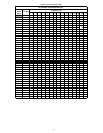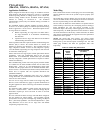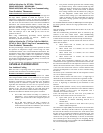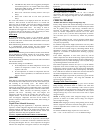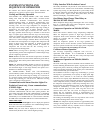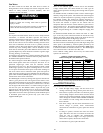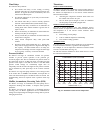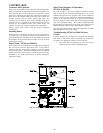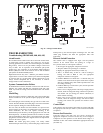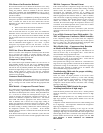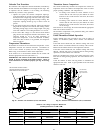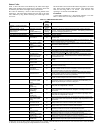
47
SYSTEM FUNCTIONS AND
SEQUENCE OF OPERATION
The outdoor unit control system has special functions. The
following is an overview of the two--stage control functions:
Cooling and Heating Operation
286A/187ANA and 288ANA/180ANA (with serial numbers
starting with 3809 and later) utilize either a standard indoor
thermostat or Evolution Communication User Interface.
288ANA/180ANA utilize an Evolution communicating User
Interface only. With a call for first stage cooling, the outdoor fan,
reversing valve, and low stage compressor are energized. If
low--stage cannot satisfy cooling demand, high--stage cooling is
energized by the second stage of indoor thermostat or User
Interface. After second stage is satisfied, the unit returns to
low--stage operation until first stage is satisfied or until second
stage is required again. When both first stage and second stage
cooling are satisfied, the compressor will shut off. The reversing
valve will remain energized until the control board power is
removed or a call for heating in initiated. With a call for heating,
the outdoor fan and compressor are energized. The compressor will
operate in high or low stage operation, as needed to meet the
heating demand. When the heating demand is satisfied, the
compressor and fan will shut off. The reversing valve is
de--energized in the heating mode.
NOTE: When two--stage unit is operating at low--stage, system
vapor (suction) pressure will be higher than a standard single--stage
system or high--stage operation.
NOTE: Outdoor fan motor will continue to operate for one minute
after compressor shuts off, when outdoor ambient is greater than or
equal to 100°F. This reduces pressure differential for easier starting
on next cycle.
NOTE: On 286ANA/187ANA models, if unit has not operated
within the past 12 hours, or following a unit power--up, upon the
next thermostat high-- or low--stage demand, unit operates for a
minimum of 5 minutes in high--stage.
On 286ANA/187ANA models with non--communicating
(non--Evolution) systems, with first stage of cooling, Y1 and O are
powered on; and with second stage of cooling, Y1, Y2, and O are
on. For these systems, with first stage of heating Y1 is on and for
second stage of heating, Y1 and Y2 are on. When the reversing
valve is energized, O is powered on.
Communication and Status Function Lights For
Evolution Control only, Green communications
(COMM) Light
A green LED (COMM light) on the outdoor board indicates
successful communication with the other system products. The
green LED will remain OFF until communication is established.
Once a valid command is received, the green LED will turn ON
continuously. If no communication is received within 2 minutes,
the LED will be turned OFF until the next valid communication.
Amber Status
Light
An amber colored STATUS light is used to display the operation
mode and fault codes as specified in the troubleshooting section.
See Table 17 for codes and definitions.
NOTE: Only one code will be displayed on the outdoor unit
control board (the most recent, with the highest priority).
Utility Interface With Evolution Control
The utility curtailment relay should be wired between R and Y2
connections on the control board for Evolution Communicating
systems only (see Fig. 42.) This input allows a power utility device
to interrupt compressor operation during peak load periods. When
the utility sends a signal to shut the system down, the User
Interface will display, “Curtailment Active”.
One Minute Stage Change Time Delay on
286ANA/187ANA Models
When compressor changes stages from high to low or low to high,
there is a 1--minute time delay before compressor restarts. The
outdoor fan motor remains running.
Compressor Operation on 286ANA/187ANA
Models
These units contain a Bristol 2--stage reciprocating compressor.
When the compressor operates in high stage operation, the
compressor motor rotates clockwise. Both the lower and upper
pistons are eccentric with the rotating crankshaft and both
compress refrigerant.
When the compressor operates in low stage operation, the
compressor motor reverses direction (rotates counterclockwise).
The lower piston becomes idle and the upper piston compresses
refrigerant. The start and run windings are reversed.
Crankcase Heater Operation
The two--stage reciprocating compressor does not have a
replaceable CCH available. It is recommended to disconnect,
electronically, the faulty CCH and add a belly band style CCH
should a CCH failure be determined.
Compressor Operation on 288ANA/180ANA
Models:
The basic scroll design has been modified with the addition of an
internal unloading mechanism that opens a bypass port in the first
compression pocket, effectively reducing the displacement of the
scroll. The opening and closing of the bypass port is controlled by
an internal electrically operated solenoid.
The modulated scroll uses a single step of unloading to go from
full capacity to approximately 67% capacity. A single speed, high
efficiency motor continues to run while the scroll modulates
between the two capacity steps. Modulation is achieved by venting
a portion of the gas in the first suction pocket back to the low side
of the compressor, thereby reducing the effective displacement of
the compressor. Full capacity is achieved by blocking these vents,
thus increasing the displacement to 100%. A DC solenoid in the
compressor controlled by a rectified 24 volt AC signal in the
external solenoid plug moves the slider ring that covers and
uncovers these vents. The vent covers are arranged in such a
manner that the compressor operates at approximately 67%
capacity when the solenoid is not energized and 100% capacity
when the solenoid is energized.
The loading and unloading of the two step scroll is done “on the
fly” without shutting off the motor between steps.
NOTE: 67% compressor capacity translates to approximately 80%
cooling or heating capacity at the indoor coil. The compressor will
always start unloaded and stay unloaded for five seconds even
when the thermostat is calling for high stage.



